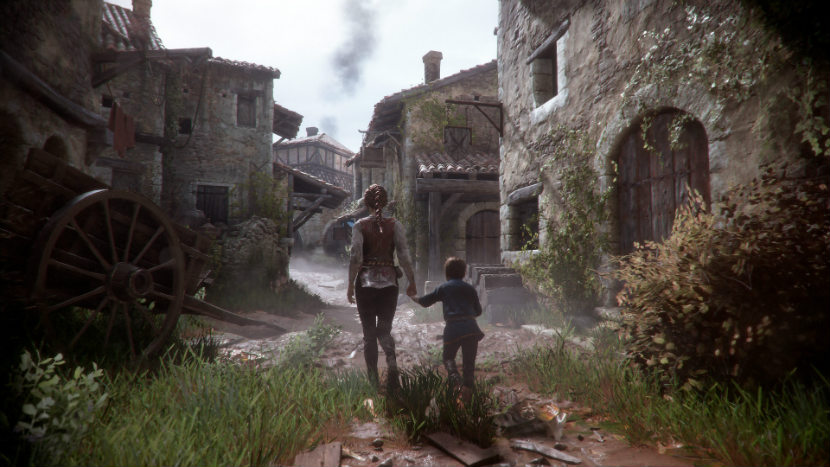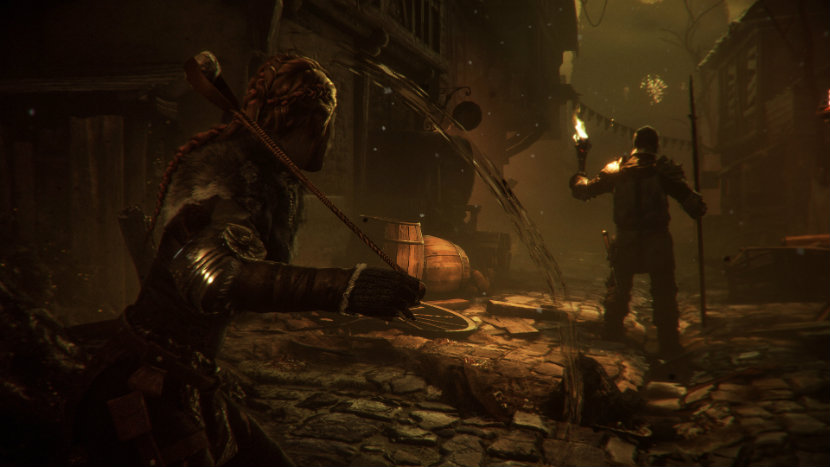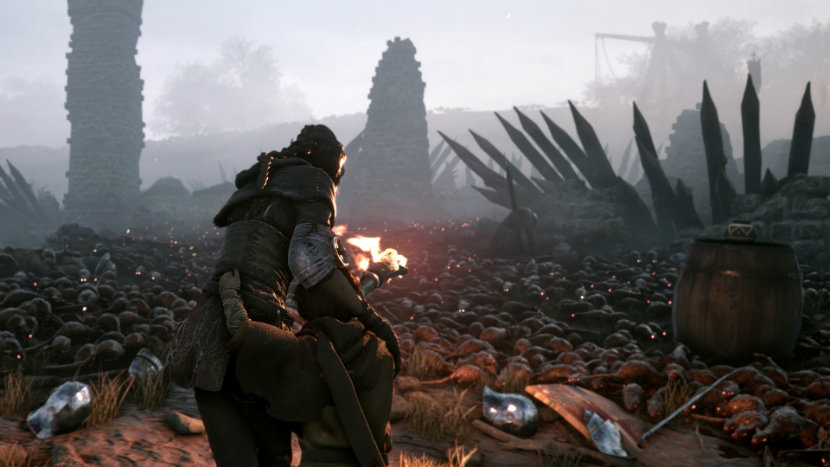A Plague Tale: Innocence, developed by Asobo Studio and published by Focus Home Interactive, caught my interest right away when it was revealed in 2017. A moody adventure-like game using the famous Black Death as its setting, with a supernatural bent? Sign me up. I went in expecting more of a horror experience, what with the dark imagery and hordes of rats featured in most of the marketing. Instead, A Plague Tale is more of a calmly-paced series of puzzles, with urgency fueled by several hours of thoughtful, character-driven drama. It’s more comic book than historical fiction, and a little janky. But throughout its runtime A Plague Tale feels smart, earnest, and stimulating due to a combination of likable characters, striking visuals, well-designed puzzles, and thousands of rats.
Mischiefs from Hell

The best thing about A Plague Tale: Innocence is it knows how to play its cards. The game knows you know about the rats. And it knows you want to see those dang rats. Naturally, it takes its sweet time actually showing you the rats. But boy does the tension build until that moment. Even before the thousands of skittering demons show themselves, they are background actors in the story, which revolves around young girl Amicia and her younger brother Hugo.
The actual story at hand is about a bond between siblings that develops despite every circumstance imaginable working against it. Hugo is sick with a mysterious affliction, and Amicia isn’t allowed anywhere near him, until the Inquisition attacks the family castle. The two are violently forced out of their home, at what happens to be the exact same time the Black Death is just getting started. While history tells us the Plague was spread via flea bites, here we get hordes of demonic rats, which literally burst from underground like landmine explosions. As each actor is introduced, the story glides into “are people the real monsters?” territory, which is old hat at this point. But the individual parts are each compelling enough to make the overall narrative tropes easy to digest.
To keep Hugo alive, Amicia has to be both sneaky and resourceful. Gameplay takes a couple different forms throughout A Plague Tale, combining rapid-fire series of environmental puzzles with pass/fail stealth maneuvering. Amicia must hide from the generally unfriendly humans, and use her tools and surroundings to make it past large swaths of rats, which essentially function in this world as hellish land piranhas. Amicia is armed with a sling that uses rocks, as well as various alchemic concoctions she learns throughout the journey. Thus, another large part of the experience is quietly nudging into as many nooks and crannies as possible to pick up ingredients for crafting. That part feels more like a check mark crossed off a list – the alchemy tools are integral, but puttering around for parts feels divorced from the rest of the experience.
Critical Thinking With the Bubonic Plague

The puzzles are generally a lot of fun to get through. Much of the puzzle play revolves around manipulating various sources of light, as the rats can only flood dark spaces. They will spill into an area from any opening, and fill every space they possibly can, but light repels them entirely. Puzzles involve lighting torches, moving quickly while holding a burning stick, manipulating stationary lanterns, and more. These puzzles are often relatively simple, as Amicia and Hugo are not durable video game heroes. But the simplicity lies in the player’s ability to juggle multiple kinds of information, from remembering what each tool does, to reading and understanding their surroundings, and anticipating various kinds of timing. Messing up is an instant death, and gratification really flows when everything clicks into place.
As each new tool is introduced, the puzzles grow more complex to allow players space to try different approaches. Sometimes there is only one right answer, but other puzzles allow for multiple approaches, including using certain “get out of jail free” tools that are essentially cheat buttons, but soak up resources that could be better used for upgrades. By the end of the game, things change significantly for important plot reasons I can’t spoil, and you have to use all your built up prowess to approach scenarios from a new angle. The path from frantically avoiding rats to being a master of A Plague Tale’s systems is paced thoughtfully in terms of design, and is paired well with the developing story. Everything feels like it matters.
Don’t Forget to Update

Occasionally, A Plague Tale shows some signs of wear and tear. Early on in the review process, the game felt a little jittery or framey at times, but a patch delivered ahead of launch smoothed it out a lot. However, the game is also a bit janky in some other ways, that can lead to frustrations, especially since failing generally instantly follows mistakes. Sometimes puzzles require precision the game’s controls don’t support fully, making an obvious answer a challenge in fumbling with the controller. There are a few combat-like sections as well, which are a pain as this game is not really built for what it asks for in these moments. Luckily, the checkpoints are fairly generous, so messing up hardly sets you back far. Ensuring the player can get right back to trying again goes a long way to maintain the story’s pace. Overall, the technical issues I experienced were minor at their worst.
My time with A Plague Tale: Innocence felt like stumbling across a low-budget, but well-made genre flick in a rental store that was placed in the horror section because it didn’t fit in anywhere else. Sometimes, when thousands of rats are pouring into a room from gutters, from holes in the wall, from the literal Earth, it’s genuinely unsettling. Other times, the rats bounce within their boundaries in ways that expose them as computer programming, and it’s hard to think of them as anything but puzzle components. But those puzzles were a pleasure to solve, and the meaty, dramatic story tying them together was compelling all the way through, even when it got bizarre at the end. A Plague Tale feels like the sort of game that gets passed over unwittingly, so here’s me suggesting to you, readers, make sure that doesn’t happen.
A Plague Tale: Innocence review code provided by publisher. Version 1.02 reviewed on a PS4. For more information on scoring please see our Review Policy.
-
Smart, stimulating puzzle-like challenges
-
Well told story with likable characters
-
The whole rat thing is really good
-
Occasional jank
-
One-hit deaths are fine in stealth and puzzles, not so much in sustained combat
-
Ingredient gathering feels tacked-on








